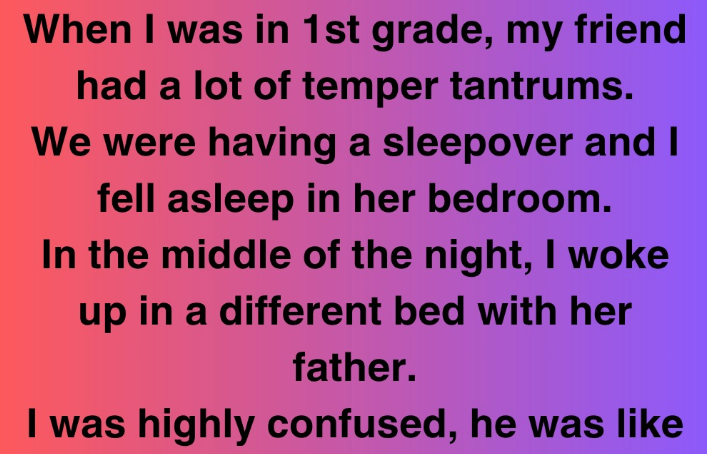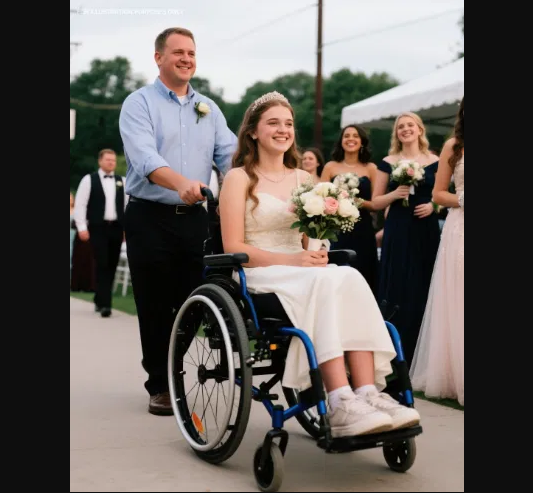When I was in first grade, my friend Rina often had intense temper tantrums. One night, we planned a sleepover, and I drifted off to sleep in her cozy bedroom. Hours later, in the stillness of the night, I woke up in a different bed, beside her father. Confusion overwhelmed me. He spoke softly, saying, “Hey there, kiddo. You wandered in here sleepwalking. It’s fine. Head back to bed.”
I felt groggy, scared, and disoriented. I had no memory of moving. His voice was steady, almost soothing, but the room felt wrong—dark, lacking the familiar comfort of stuffed animals, with only the scent of cologne and stale coffee lingering. I sat up, muttering an apology, and he gently led me back to Rina’s room, where she lay sprawled across her bed, arm dangling, still fast asleep.
Sleep eluded me for the rest of the night. I lay awake, staring at the ceiling until dawn broke and birds began to sing. I kept the experience to myself, not even telling my mom. Perhaps I didn’t fully grasp what had happened. I wasn’t hurt, but a deep confusion settled in me.
As a child, I assumed adults always knew best. I convinced myself I might have sleepwalked, that this was simply an odd moment. He hadn’t raised his voice or seemed upset, yet his hand rested on my back a moment too long as he guided me out. That small detail stuck with me, like a splinter I couldn’t ignore.
Years passed. I never returned to Rina’s house. I told my mom I didn’t want to sleep over anymore, offering a vague excuse. My friendship with Rina faded, and we ended up in different classes the following year.
By middle school, Rina had moved away. I didn’t hear of her again until high school, when I spotted her in an Instagram story at a party. Her hair was dyed vibrant blue, her eyeliner bold and fierce, her expression defiant as she gestured at the camera. A month later, a local news article caught my attention: “Teen Injured in Domestic Disturbance.” No names were mentioned, but the blurry photo of a familiar house confirmed it was Rina’s. Soon after, whispers circulated that her father had been arrested for unsettling behavior.
I still kept my story locked away.
It wasn’t until I became a mother that everything shifted. My daughter, Lali, was six when she was invited to a sleepover at her friend Maribel’s house. Maribel was a sweet child, and her mom was warm and talkative during school pickups. Yet, when the invitation came, a chill gripped my heart. I agreed at first, but that night, panic consumed me. I sat on my bed, staring at Lali’s packed backpack—her pajamas and stuffed turtle ready to go—and I couldn’t let her leave.
That night, I confided in my husband, Rehan. He’s a steady, compassionate man, never one for theatrics. In a hushed voice, I shared the memory of waking up in a strange bed at six years old. He listened quietly, letting me speak without interruption. When I finished, he simply said, “You made the right call keeping Lali home.”
That moment opened something within me. I began writing to process the memory. I didn’t intend to make a fuss or even fully define what had happened. It was like pulling a thorn that had been embedded for years. The story poured out in one sitting, saved in a password-protected Google Doc, meant only for me.
One evening, while browsing Facebook, I stumbled across a post from a woman in our town. She shared a story about her niece being followed in a parking lot, a warning that resonated widely. Moved, I left a brief comment: “Something happened to me as a kid that only made sense when I became a mom. Trust your instincts.”
The response was overwhelming. People thanked me, shared their own vague childhood memories that left them uneasy, and admitted to feeling uncertain for years. That night, something in me broke free, like a river overflowing its banks.
The following week, I joined a small writing group at our local library, a circle of five women who met every Thursday. I hesitated to share my story, but eventually, I read it aloud. One woman, Flavia, with a sharp jawline and sharper memory, listened intently. When I finished, she asked, “What was the family’s last name?”
I told her: Halstrom. She fell silent.
The next week, Flavia brought a yellowed newspaper clipping from 2009. The headline read, “Man Faces Trial In Long-Delayed Assault Case.” It was Rina’s father. My heart sank. Flavia shared that he’d briefly been a teacher at her cousin’s school, fired under mysterious circumstances. Her cousin had always called Mr. Halstrom “a weirdo.”
I realized I wasn’t alone. Anger surged that he’d evaded accountability for so long, but relief followed, knowing others might have spoken up.
I debated coming forward. It had been over two decades, and my memory was hazy, with no evidence to offer. Still, I felt compelled to find Rina. I tracked down her cousin on social media and sent a message, expecting silence. Three days later, Rina called.
Her voice was deeper, weary, but she remembered me. I explained why I’d reached out. After a long pause, she said, “I always wondered if something happened to you too.” Those words struck me deeply.
Rina had testified against her father, having cut contact years earlier after therapy and a breakdown. The court case involved another victim, but her testimony strengthened the case. I admitted I wasn’t sure my story could help. She replied, “Even a statement, even if it’s not enough for court—it helps show there’s a pattern.”
So I wrote an affidavit, detailing everything I could recall: the disorientation, his calm voice, the lingering touch. It felt insignificant, but it wasn’t. Two more women came forward after me, one from a 1996 summer camp. The case grew, and Rina’s father was sentenced to fifteen years in prison.
I still don’t know the full truth of that night. But I know what didn’t happen: he didn’t harm my daughter or others who might have crossed his path if the silence had persisted.
Here’s the part that moves me to tears every time: months after the trial, I received a handwritten letter from Rina. She was in a program training to become a counselor for trauma survivors. She wrote that she wouldn’t be here without the few who believed her, and that my Facebook comment was the first moment she felt less alone. Tucked inside was a drawing of two little girls in bunk beds, one smiling down at the other.
I keep that letter in my nightstand.
The takeaway? Trust your instincts, especially when they’re quiet but persistent. A fleeting moment—an odd glance, a misplaced touch, a story that feels off—can hint at a larger truth. You don’t need the whole picture to speak up. Even a small spark can light the way for someone else.
Our stories, even the incomplete ones, carry weight. If this resonates with you, consider sharing it. Your voice might reach someone who needs to know they’re not alone, not crazy, and not too late. ❤️
Please share this story if it touched you—it could be the spark someone needs to find their own truth.




